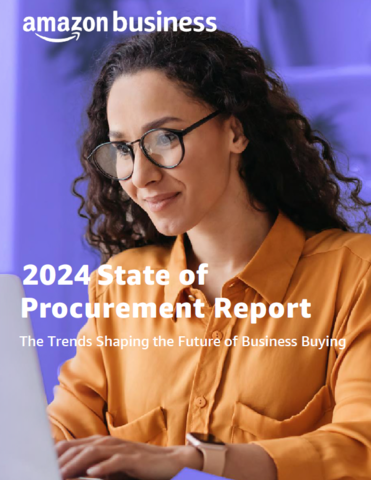How effective procurement can engage and retain staff
Sponsored by Amazon BusinessWhen employees are empowered to excel, they become motivated and committed to the business’s success. Utilizing digital procurement processes can help ensure that employees have access to what they need when they need it.

In the current economic climate, it’s essential that organisations do all they can to ensure staff have the tools they need to perform their roles effectively if they are to remain productive and motivated.
The procurement function has an important role to play here, by offering staff a seamless process of sourcing the items they need to do their jobs and helping to make their working lives more manageable.
Shelley Salomon, VP of Amazon Business, says employees now expect to receive the same level of service in their professional lives as they do in their personal ones, which extends to the technology they use. “In an era where the lines between personal and professional lives are increasingly blurred, replicating consumer experiences in business buying has become essential,” she says.
“It’s not just about making their daily tasks easier; it’s about driving productivity and business growth,” she adds. “Whether they’re shopping for themselves or for their business, customers expect a vast selection, great prices, and a convenient shopping experience.”
Many organisations, however, need help delivering this, relying instead on antiquated enterprise resource planning (ERP) systems and cumbersome workflows that frustrate employees.
There are several risks here for organisations if they cannot deliver the kind of internal procurement processes that employees need to help keep the business functioning. “First, these systems can be complex and outdated, making everyday tasks cumbersome and time-consuming,” says Salomon.
This leads to other issues. Research by Gallup suggests disengaged employees have 37 per cent higher absenteeism and 18 per cent lower productivity rates. It can also spill over into people deciding to move on: the Work Institute finds that 75 per cent of the causes of employee turnover are preventable and that job dissatisfaction is a significant factor. With many organisations continuing to experience recruitment difficulties, maintaining high levels of employee engagement and retention is essential.
There are other compelling reasons why an organisation’s procurement processes must be as efficient as possible. Inefficient ERP systems cause delays, errors and unnecessary repetition of tasks, leading to customer complaints, impacting the organisation’s wider reputation. Research by Deloitte suggests that 45 per cent of organisations have also faced compliance risks due to poor integration and data inaccuracies in ERP systems. All these elements can cause stress for employees in different parts of the business, impacting productivity, satisfaction and retention, and proving costly to the organisation.
“Overly complex ERP systems or procurement processes can create a cascade of negative effects,” says Salomon. “When organizations make it tough for employees to use ERP systems for procurement processes, they face risks such as delays, errors, and redundant tasks, all of which can hurt corporate culture and stifle innovation.
“To tackle these frustrations, businesses are focusing on modernizing operations, improving user experience, leveraging better data, and committing to sustainable practices. By addressing these areas, we can improve procurement processes, save costs, and better align our organizations.”
The importance of operational efficiency in procurement is reflected in the recent Deloitte 2023 Global Chief Procurement Officer Survey, which found 78 per cent of chief procurement officers now see it as vital to the success of the function. A separate survey by Bank of America finds that 80 per cent of small businesses are already optimising their operations through digital technology.
Organisations with effective digital procurement technology can allow employees to benefit from the use of machine learning, ensuring more personalised buying experiences.
“AI and machine learning help us respond fast, offering actionable insights and streamlined workflows. This ensures supply continuity and tackles inflationary pressures, which are top priorities for many businesses. Bringing AI into procurement isn’t just a tech upgrade—it’s a strategic move towards smarter business buying,” explains Salomon. Amazon Business, for instance, offers curated shopping lists and guided buying (available with select Business Prime plans), allowing employees to effortlessly find the right products by steering them to appropriate choices.
According to the Amazon Business 2024 State of Procurement data report, most (80 per cent) procurement professionals are willing to integrate AI, including machine learning, into their procurement processes within the next two years.
It also suggests that almost all (98 per cent) of decision-makers are planning investments or upgrades in analytics and insights tools, automation and AI-driven optimisation of purchasing decisions in the foreseeable future.
“When we provide our teams with user-friendly procurement tools, it helps our businesses thrive, maximize resources, and stay competitive. Leaders should continue pushing for these advancements to support growth and success,” says Salomon.
That, in turn, will filter through into more satisfied employees who can do a better job and are more likely to stay, ultimately leading to better organisational performance.
To find out more about how Amazon Business can help you adopt digital procurement processes supported by machine learning, visit business.amazon.co.uk/.

Business Reporter Team
Most Viewed
Winston House, 3rd Floor, Units 306-309, 2-4 Dollis Park, London, N3 1HF
23-29 Hendon Lane, London, N3 1RT
020 8349 4363
© 2025, Lyonsdown Limited. Business Reporter® is a registered trademark of Lyonsdown Ltd. VAT registration number: 830519543





